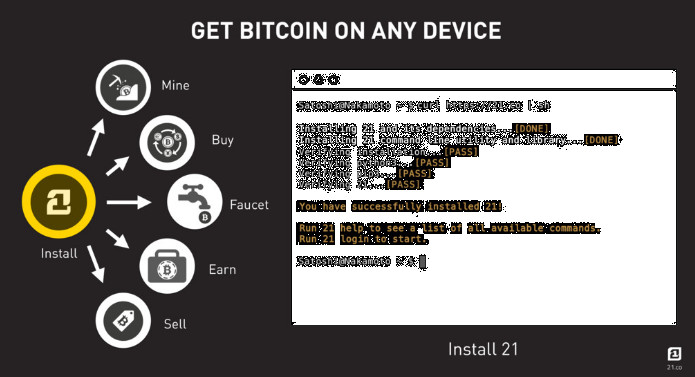| 21 - Bitcoin For Everyone |
| Written by Nikos Vaggalis | |||
| Wednesday, 22 June 2016 | |||
|
21, a mixture between a platform, an app and a service, is setting out to become the third world wide web. It draws on the foundations of the www for inspiration, the first built on HTML, the second, the Social Web, built on personalization, and gazes boldly into the future, paving the way for a third kind of the web, the one built on Bitcoin.
As it stands, the world wide web cannot address the fundamental issue faced by content and service providers who base their businesses on it, namely financing. Providers have either to rely on ad enabled freemium content, or put their content behind a paywall as a subscriber only service. Both of these options had proved inefficient. Paywalls are systems designed to monetize online and other digital information by preventing visitors from accessing web sites and similar content providers without having a paid subscription. Online news and sports web sites are the most frequent users of paywalls. But what if there was a model, in which the consumer could enjoy ad free premium content and the publisher would also be able to maintain a sustainable source of revenue? This basic principle is what formulates and sets the third world wide web in motion. In that kind of the web, things will be simplified; the process of paying for digital goods would be reduced to just clicking on a hypertext link, an action that would automatically initiate an autonomous transaction between the machine paying for the service and the one providing the service, funded by an electronic wallet tied to the payer machine. This way, human intervention would soon become history. This process also assumes that a human has set up a traditional bank account and linked it to PayPal. Furthermore he shares the risk of the PayPal account or the associated bank account be shut off at any time, since it's not controlled by the holder himself but by a third party institution. One could argue that with the advent of SOA and platform oriented APIs, a machine could use the service's API keys, i.e Paypal's, to carry the transaction through, but then :
What is the solution to these issues? Surely there must be a better way? Enter cryptocurrency. Bitcoin with its decentralized and automated nature, is what's necessary for enabling true machine-to-machine, autonomous transactions, disengaged from any banking system. It is a machine currency. In stark contrast to the state of things currently pertaining, a machine- based, bank-independent transaction system based on bitcoin, would just require each machine to possess a private key associated with a bitcoin ewallet. This has the further advantage that as bitcoin's private keys have a cryptographically irrevocable relationship to their associated accounts, it's not possible for an administrator to “reset the password” and thereby deny a machine's access to its bitcoins. Revolutionary thinking indeed, but there are drawbacks too. First of all, ways of acquiring bitcoin, without having to mine, are pretty limited. Also setting up bitcoin-payable enabled web services over HTTP and discovering third party bitcoin-payable web services to connect to, are not the easiest of tasks. The solution to all of this is 21, software currently in beta that enables any device to gather bitcoins and any app to work with and earn bitcoins on every http request, firmly putting the Machine-Payable Web's foundations into place. In fact, 21 is not just software but assumes a different shape depending on the angle you look at it or the way you're going to treat it: Treat it as an App, and it will assume the shape of a Python command line utility that can get you bitcoins in one, or all, of the following ways: Mining, Buying, Requesting, Earning and Selling micro-services for bitcoins. Treat it as a programming Library and it will shapeshift into the open source 'two1' Python library, (other languages such as JavaScript are coming soon), a library that empowers developers in adding micro-payments to their APIs so that they can be monetized on a per-request basis without requiring access to a credit card or bank institution. Treat it as a Connector and two1 makes the act of gluing disparate and heterogeneous ‘21’ third party services together, as simple as a making a library call from code. Treat it as a Marketplace and gain the ability to navigate through 21's mesh, buying or selling API calls from or to other 21 enabled APIs. For example, for $0.0203 or 2,750 Satoshis per call you can use the Zip Code API to look up detailed information on zip codes like their State, City, Latitude, Longitude, and estimated population. This can be done as easily as firing the '21 buy' command from the shell: $ 21 buy "https://mkt.21.co/21dotco/zip_code_data/ # Output:
# {
# "EstimatedPopulation": "38763",
# "Decommisioned": "false",
# "City": "SAN FRANCISCO",
# "Long": "-122.42",
# "Lat": "37.79",
# "ZipcodeType": "STANDARD",
# "Zipcode": "94109",
# "State": "CA"
# }
Finally, and at its core, 21 is a network for exchanging virtual currency. This takes care of all the details necessary to sustain the machine-payable web, so the eager question that follows is "how do I get at those precious bitcoins?"
First of all, there is the easiest and free way - the faucet. You can request free bitcoins from 21's faucet without needing a credit card or bank account. The only thing required is to link your social media account to your 21 profile. Then you can simply generate bitcoins with: $ 21 faucet Calling '21 faucet' repeatedly can earn you coins up to the limit of 200,000 Satoshis, the caveat being that with every subsequent call the time necessary to complete increases geometrically; still it's the easiest way to get started. Then you can buy coins with '21 buybitcoin'. In that case you exchange real money for bitcoins, as such a credit card, a bank account or Coinbase account is necessary. With '21 sell', you can sell microservices (spare machine resources) for bitcoins. You need not worry about finding a buyer for these microservices; 21 takes care of that for you through the 21 marketplace. This command works by turning your computer into a miniature server that connects to the 21 Marketplace. '21 earn', still in preview mode, earns you bitcoin via microtasks. Finally, the most interesting, '21 mine', mines for bitcoins, but it won't work for any device other than the dedicated Raspberry Pi-based bitcoin machine, available for $399.
The most frequently used 21 commands are:
The full list of commands can be found on the 21 Command Line Interface How to get started $ curl https://21.co | sh iOS, Android and Windows support soon to follow. Alternatively you can get hold of a premade Docker image with: $ docker pull 21dotco/two1 After installation you should create your profile by signing up. Then, log in to your 21 account with '21 login'; test your 21 installation with '21 doctor'; and join the virtual private marketplace with '21 market join'. After that choose your learning path. Are you a consumer? Run the faucet to earn coins, sell your machine's spare resources, navigate through the marketplace and buy API calls. Are you a developer? Find out how to publish your app to 21's marketplace Then go through the tutorials, explore sample applications like Build a Simple bitcoin Game, Receive an SMS from Anyone for bitcoin, A bitcoin-Payable API, Sell or License Any File for bitcoin or check out other people's projects:
So will the notion of the 3rd web someday be realized? It all depends on 21's rate of adoption. The best thing about it is that it makes bitcoin accessible to anyone and everyone. As a consumer, you don’t need to be an expert, just follow the instructions and get involved. No matter if it succeeds or fails, it has managed to initiate the debate on the web's future, daring to envision the way to a better and more appropriate model for our times. This is a bold move certain to initiate change one way or another.
More InformationRelated ArticlesTo be informed about new articles on I Programmer, sign up for our weekly newsletter,subscribe to the RSS feed and follow us on, Twitter, Facebook, Google+ or Linkedin.
Comments
or email your comment to: comments@i-programmer.info
|
|||
| Last Updated ( Wednesday, 22 June 2016 ) |





